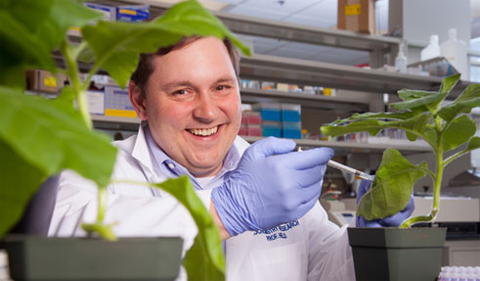Dr. Ahmed Faik, Associate Professor of Environmental & Plant Biology at Ohio University, is the principal investigator on a one-year $200,000 grant from the U.S. Department of Agriculture’s Agriculture and Food Research Initiative exploratory research grant program for a project titled “Developing A High-Throughput Analytical Tool For Plant Cell Wall Genomics.”
The co-PIs are Dr. Hao Chen, Professor of Chemistry and Environmental Science at the New Jersey Institute of Technology, and Dr. Michael Held, Associate Professor of Chemistry and Biochemistry at OHIO. The faculty are also members of the Molecular and Cellular Biology interdisciplinary graduate program.
Their work will integrate molecular biology and biochemical approaches to develop high throughput analytical tools to decipher the synthesis of plant cell walls, the most abundant source of organic carbon on Earth.
“The Exploratory Research Grant program fosters the creation of transformative innovations that address plant and animal health and production, food safety and nutrition, bioenergy, natural resources and environment, agriculture systems, technology, agricultural economics and rural communities. The Agriculture and Food Research Initiative is America’s flagship competitive grants program for foundational and translational research, education, and extension projects in the food and agricultural sciences,” according to a USDA announcement.
The OHIO project start date is May 1, 2019.
Project Summary: Glycosyltranferases (GTs) synthesize all carbohydrates on Earth including plant cell wall (CW) polysaccharides. Not only plant are CWs the first protective barrier from disease, water loss, and abiotic stresses, but CW polysaccharides are also part of our everyday life and offer opportunities for economic advancement, such as raw materials for biofuel production and food products. Progress in the functional biochemical analysis of plant GTs has been slow, due in large part to inadequate high-throughput expression methods and limited product detection techniques. The overall goal of this project is to develop a combination of analytical tools to advance the high-throughput characterization of GTs in terms of biochemical function, protein-protein interactions, and reaction product analysis. These tools are Nucleic Acid Programmable Protein Array (NAPPA), and Probe Electrospray Ionization-Mass Spectrometry (PESI-MS). The objectives are: 1) optimize NAPPA to enzyme assays in multi-well plate format using GTs for which the assays are established; 2) optimize NAPPA for analysis of assembly of synthase complexes using two synthase complexes for which the interactions have been demonstrated; 3) optimize PESI-MS for large scale product analysis directly on multi-well plates. The project answers the requirements of the Exploratory Research Program, as we propose a set of tools that integrate molecular biology and biochemical approaches in a high-throughput manner to decipher the synthesis of plant CWs, the most abundant source of organic carbon on Earth. The proposed work is not appropriate for an existing program under AFRI because it does not use whole plant, agronomic or eco-physiological approaches.





















Comments